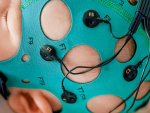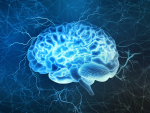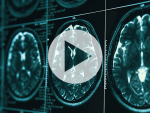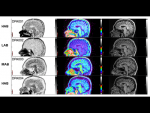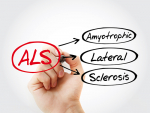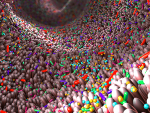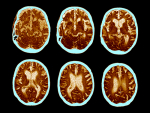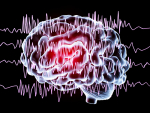Displaying items by tag: department of neurology
The M.D./Ph.D. student has since moved on to clinical studies, but the research into possible drugs to treat Alzheimer’s disease continues.
Tagged under
While preventive treatment with vigabatrin delayed the onset and prevalence of infantile spasms in TSC infants, it had no impact on focal seizures, drug-resistant epilepsy, or improvement of cognitive and behavioral scores at 24 months.
Tagged under
Rachel Smith, Ph.D., professor in the UAB School of Engineering and principal investigator in the Neural Signal Processing and Modeling lab, was recently awarded multiple grants to fund research in seizure onset localization.
Tagged under
TCE is a known environmental risk factor for parkinsonism. UAB researchers will evaluate whether T cell activation caused by TCE exposure leads to cognitive decline.
Tagged under
The National Ataxia Foundation has named UAB a Center of Excellence. The designation is awarded to regional centers providing comprehensive care and services for individuals affected by ataxia and their families.
Tagged under
Periodontal disease is one of the leading causes of tooth loss in adults and may be a risk factor in the development of Alzheimer’s disease.
Tagged under
In a mouse model, border-associated macrophages, not microglia, were essential for the neuroinflammation that precedes neurodegradation. Targeting this subset could be a disease-modifying therapy in neurodegenerative disease.
Tagged under
UAB scientist aims to inspire children from underrepresented backgrounds to pursue a career in science and help them understand that achieving their passions is possible.
Tagged under
IN8bio has opened a new Birmingham facility, a 10,000-square-foot advanced research and development laboratory in the Martin Biscuit Building at Pepper Place.
Tagged under
UAB was involved in clinical trials that led to an accelerated approval of the drug lecanemab, commercially known as Leqembi, in January 2023. A UAB Alzheimer’s expert discusses the therapy and what full approval means for the AD field.
The scholarship recognizes outstanding natural sciences, engineering and mathematics students by awarding up to $7,500 for academic expenses.
Tagged under
- release
- honors college
- college of arts and sciences
- school of health professions
- school of engineering
- department of biomedical engineering
- neuroscience
- center for community outreach development
- office of national and international fellowships and scholarships
- office of the provost for student and faculty success
- department of neurology
- school of medicine
- national and international fellowships and scholarships
As a caregiver to his adult son, Anderson was able to earn his master’s degree at UAB and turn his interest in magic arts into deception research and a second career in academics.
Tagged under
Neuroengineering blends engineering principles with neuroscience to find better ways to treat neurological conditions and to build on understanding how the brain and nervous system function.
Tagged under
The findings indicate that inflammation is present in the brain early in the disease’s progression, but how inflammation affects disease progression remains unknown.
Tagged under
The clinic, supported by an Alabama Department of Commerce Innovation Fund grant, makes it easier for patients to get all the services they need in one place.
Tagged under
The study, utilizing the relatively new field of metagenomics, demonstrated an imbalance in the gut microbiome of patients with Parkinson’s disease.
Tagged under
The AHEAD study is looking to recruit people at risk for developing Alzheimer’s disease for a new study.
Tagged under
The gift will advance the use of induced pluripotent stem cells as a potential therapy for Alzheimer’s disease.
An internationally recognized clinician and researcher in Parkinson’s disease, UAB’s David Standaert, M.D., Ph.D., has been honored with a lifetime achievement award from the Parkinson’s Association of Alabama.
Tagged under
The new technique to predict seizure clusters could, if confirmed, have a profound impact on patients with drug-resistant epilepsy who are prone to seizure clusters.
Tagged under

